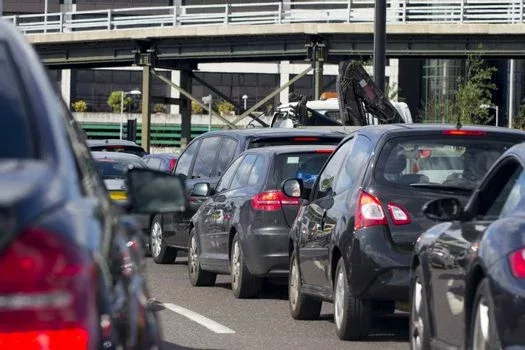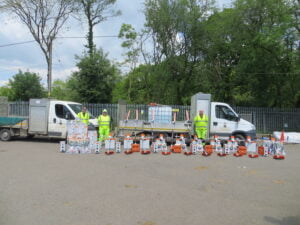Now is the time to rethink the mobility of our goods to ensure the increased demand does not come at the expense of public health and the environment, according to a new report by the Centre for London.
At the same time, in its report, the Centre also highlights an opportunity to remove inefficiencies in the system such as delays caused by traffic.
The new research, led by Centre for London, is exploring how to create a smarter and more sustainable freight and logistics ecosystem in the capital.
Deliveries have kept the city ticking over the last 18 months, with a steep increase in online sales. Online purchases made up 34.6% of total UK retail sales in February 2021, compared to 18.3% in February 2019. Beyond this the pandemic has also illustrated the importance of an efficient freight and deliveries infrastructure, which supports businesses to receive the goods and services they need, and our public services to operate, said the report.
Most goods, and many of the service providers that people rely on, move around on London’s roads. More than 20% of London’s road network capacity is taken up by freight and logistics vehicles and this has increased over the last decade. Between 2009 and 2019 the number of vehicle miles driven by light goods vehicles (LGVs) increased by 62%, from 2.4 billion to 3.9 billion. This compares to a 17% increase in vehicle miles travelled by cars and taxis over the same period (14.9 billion to 17.5 billion). Transport for London has also projected a 43% increase in the kilometres travelled by vans between 2019 and 2041, with a potential knock-on effect for congestion and air pollution.
Centre for London’s research funded by Prologis UK, Grid Smarter Cities, Impact on Urban Health and the London Borough of Southwark, will also look at good practice being developed in London and other cities, to deliver freight and logistics infrastructure fit for the 21st century. The Centre will publish a final report in autumn 2021 including recommendations to policymakers, developers, landowners and freight and logistics businesses to create a more efficient and sustainable freight and logistics system in the capital.
Rob Whitehead, Director of Strategic Projects at Centre for London said: “Most of us like having low cost and fast home deliveries – and businesses and carriers have been working hard to fulfil this rising demand. They also are essential for moving food, medicine and other critical items around.
“But there is a serious risk that goods vehicles will come to dominate our roads, increasing congestion and contributing to poor air quality. We urgently need to look at solutions to make the delivery of goods more efficient and sustainable – which is what Centre for London has set out to do with this new research.”
Robin Woodbridge, Head of UK Capital Deployment, Prologis UK “The pandemic accelerated an increase in home deliveries and levels are unlikely to reduce post-covid because of the time it gives people back: this means we must plan for a future where freight distribution or consolidation centres are located close to where people live and work.
“There is a damaging misconception that locating these facilities outside of cities is good for sustainability, reducing traffic and improving air quality: that couldn’t be further from the truth, indeed, research has shown that sustainability gains are higher if these facilities are located as close as possible to the end consumer. Addressing these misconceptions and encouraging collaboration across key stakeholder groups is a key reason why we are supporting this research by Centre for London.”
Neil Herron, Founder & CEO, Grid Smarter Cities said: “The pandemic highlighted the importance we all place on the delivery and freight sector to bring us the goods we rely on in a timely way. As demand for online deliveries continues to exponentially grow; safer, greener and more equitable options are urgently needed that off-set the environmental impact.
“Digital kerbside management solutions for freight, servicing & delivery access will help to bring order to the chaos of the kerbside and significantly reduce miles driven and CO2 emissions on the capital’s roads – while supporting climate action plans and new revenue streams for cities.
“Grid Smarter Cities is proud to support the Centre for London in undertaking this important independent research as we embrace and understand the need for sector specific technological and policy driven interventions to better manage urban logistics at the kerbside.’’
Kate Langford, Programme Director of Impact on Urban Health’s Health Effects of Air Pollution programme, said: “There is substantial evidence that air pollution disproportionately affects the health of children, older people and people with heart and lung conditions. Air pollution also intersects with other systemic causes of ill health, like unemployment and noise pollution, and so has a disproportionate effect on people who live in lower income neighbourhoods.
“This health inequity was made more apparent by COVID-19, and one vital step we need to take is to design systems that manage the rise of deliveries and online shopping. Residents must be engaged in the design of these new systems, to make sure that they protect people’s health and work for everyone.”
Cllr Catherine Rose, Cabinet Member for Transport, Parks and Sport at Southwark Council, said: “Improving air quality is a priority for Southwark Council and understanding how we can better manage goods and services moving around our borough is a crucial part of reducing of this. Putting in place the infrastructure for cycling, the use of cargo bikes, safer pedestrian routes, and rapid recharging points for electric vehicles are key aims that support local businesses to make positive choices for them and their customers. We’re therefore pleased to sponsor this research by Centre for London, which will help us to support businesses in finding innovative solutions that provide low emission, efficient logistics.”





















